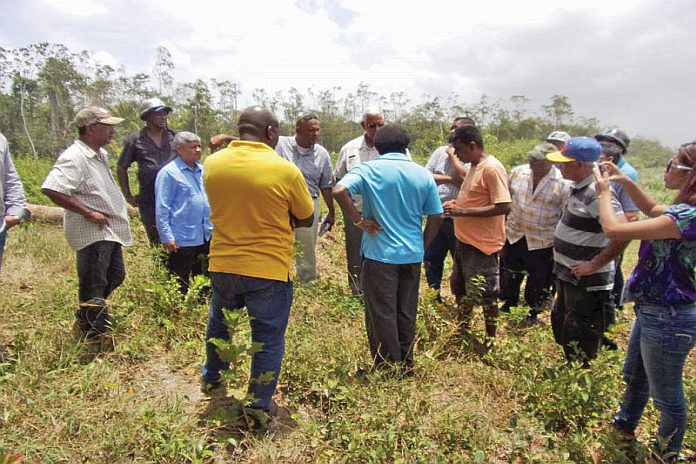By Ray Chickrie
GEORGETOWN, Guyana – Farmers in the rice sector of Guyana complain of neglect by the current coalition administration of the APNU/AFC led government of president David Granger. Farmers blame the fall in the price of rice and the government’s removal of itself as an intermediary between them and the rice millers.
Farmers also accused the government of not securing a fair price for their paddies, neglect of agriculture infrastructure and no new investments and exploitation by rice millers who now are offering them loans instead of the banks. And in all of this, they see the race card.
Farmers in Courantyne contrast how the Peoples Progressive Party (PPP) government waived taxes for farmers to buy tractors and other things related to farming. However, when the APNU/AFC government took office, all farm subsidies and tax breaks were revoked. This is a major complain that farmers have with the current government.
“The government doesn’t care about us, we are Indians,” this was the sentiment over and over in Berbice. Nothing for Blackbush. Nothing more was added, no new projects since the PPP left office.”
One farmer at Mibikuri remarked: “Paddy dropped due to millers and farmers having to deal one on one; now, the government removed itself from guaranteeing the farmers a good price for paddy”.
The price of rice has drastically dropped since the new government took office said some Courantyne farmers, a stronghold of the Indian dominated PPP party which is now in opposition. Rice farmers are mostly Guyanese of Indian descent. Farmers feel victimized by the government viewed as a “black government that holds the interest of the black community.”
“Millers and government should reinvestment in infrastructure,” said a young farmer who wants to remain anonymous.
The government is being accused of not investing in drainage and irrigation and at the same time has increased rates and taxes dramatically. Farmers said that the new government did not make any further investment in the rice industry from what the previous government left.
Roads in region ten – the Blackbush area is deteriorating. This is caused mostly from Miller’s road use of large trucks and lack of reinvesting to keep the roads motorable. Nand Persaud trucks were seen on the roads and farmers pointed at them as the culprit of damaging infrastructure.
“Why Nari or Nand Persaud don’t do research and reinvest in the community”, asked one farmer.
Also, one farmer said that Millers and the government should invest in studies, on how to deal with the “gandhi disease,” which often affects rice, and they must test that the drugs meet requirements.”
Bugs sometimes become resistant and drug rotation is necessary farmers claimed. They complained that there is no periodical spraying.
“They close the estates and the vegetation is out of control. We don’t even have access to the farm via boat. The trenches have been overtaken by vegetation,” said a farmer from the Maida/Bush Lot Farm area.
A young farmer from Mibikuri who is also based in Georgetown said: “Blackbush is the food basket of Guyana, and yet it has been neglected by the APNU/AFC coalition.” Like other farmers, he also doesn’t want to be named fearing retribution.
Farmers feel that they are now left vulnerable to the Millers. Exploitation from Millers is a sentiment expressed often. Millers are now offering farmers loans for paddy, fertilizers, drainage and irrigation. They also offer loan for capital like tractors, plough, and combines. This all means that if farmers can’t repay their loans, Millers will repossess farmers’ properties, a claim that is happening more often, now that the price of rice has dropped.
Inability to repay loans, default leads to anxiety, stress, and poverty. This has taken over the lives of some farmers. Others have committed suicide. There is little financial and mental support for farmers going through difficult times.
There is no farmer’s insurance in Guyana. Poor weather, floods, diseases or poor roads for harvesting, can wipe out an entire crop.
“Millers will give soft loans for crop and not the bank anymore. So, they make money. They will seize your assets if you can’t payback. People do kill themselves. One farmer was so frustrated that he was crying and that he killed himself.”
Meanwhile, Millers owe farmers money and some have been waiting for months to get paid. The millers owe farmers millions of dollars. Some farmers also complain about having to wait for hours and days to get their paddy process at mills. At Nand Persaud, they have to queue up for days to get their paddies graded, weight and process. And while waiting, it rains which destroys the paddy.
A year ago, the Department of Public Information (DPI), referenced agriculture minister Noel Holder. “The delay farmers experience in receiving from Millers, payment for their produce is a clear violation of the Rice Factories Act,” and is a “clear demonstration of unfair business practices.”
Guyana’s rice and other food crops are produced using a lot of pesticides and fertilizers, and there is hardly an initiative to change this.
Meanwhile, Guyana has been working with Malaysia and Indonesia to improve rice farming. How are these rich farmers benefiting from this South/South Cooperation? What about helping farmers move into the organic market?





